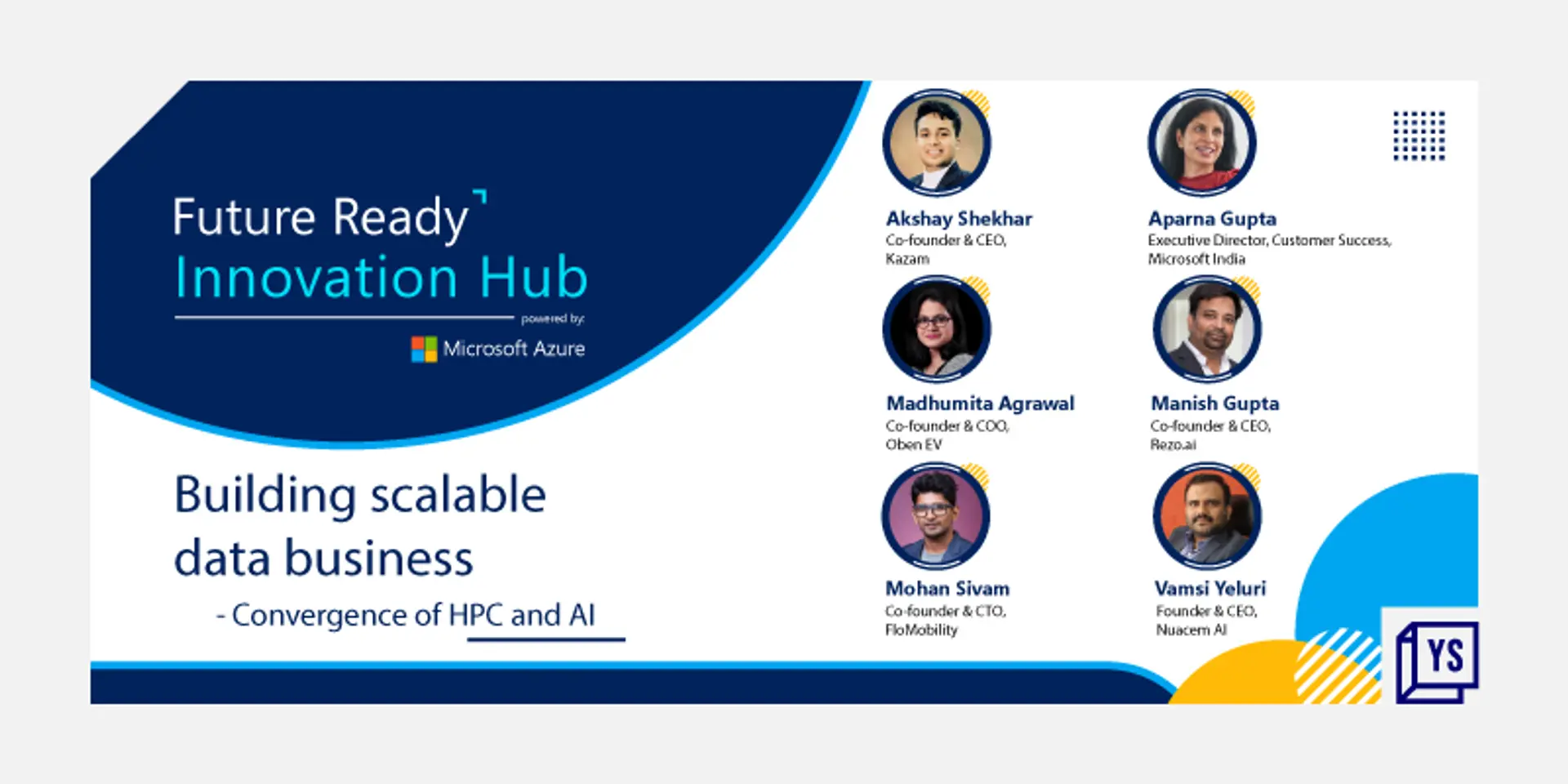
Microsoft Azure
View Brand PublisherLearn how to build a business model designed for scalability
As data increases exponentially, businesses must be scalable to adapt to the rate of change. In a roundtable discussion, founders shared insights on value-from-data aspects for long-term viability of the business.
“We have a ton of information that could potentially be converted into insights. But how to use data for better decision-making with accuracy, reliability, and sustainability? Democratising data with tools and solutions is what we need for robust data analytics,” said Aparna Gupta, Executive Director - Customer Success, Microsoft.
Aparna was speaking at a roundtable discussion titled ‘Building a scalable data business’ co-presented by Microsoft and YourStory, to discuss how data is scrutinised to generate in-depth, actionable inferences.
Building products with new data ages
Businesses are becoming digitally disruptive and following a value-from-data approach to transform products and optimise business operations.
Embracing 3,000+ charging points, battery charging services startup Kazam offers solutions [EV charging] for shops, restaurants, universities, and plot-owners. Kazam containerises data in different formats [according to battery swapping, charging stations, and vehicle types], informs co-founder and CEO Akshay Shekhar, and places them under a single cloud to understand things, for example, which battery is working, life cycle of each vehicle, to manage existing infrastructure, etc.
With an AI-powered contact centre, Rezo.ai harnesses customer data to make their interactions fast, easy, scalable, and error-free with brands. “Rezo understands the context, the customer’s persona from the historical conversations or interactions from the CRM data and is able to guide and resolve those queries in real-time. Enterprises doing market research can analyse customer base data to provide recommendations or suggestions,” said Manish Gupta, Co-founder and CEO, Rezo.ai.
For Madhumita Agarwal, Co-founder and COO, Oben EV, product is the hero. “We are a hardware product company, automotive products with a focus on reliability, performance, and design. We are harnessing the customer data for improving the product [safety] and introducing gamification for enhanced customer experience,” she said.
Next, Vamsi Yeluri, Founder and CEO, Nuacem AI spoke on building customer relationships with brands using AI platforms. According to him, conversational AI drives next-generation customer interactions, and with AI/ML capabilities pragmatic or service-driven approaches facilitate omnichannel engagement at scale.
Flo Mobility co-founder and CTO Mohan Sivam highlighted the key advantages of data to unlock growth opportunities. “We do data collection and processing as a value chain for different business models or market segments. As a modular autonomous tech company, we focus on building autonomous technology applicable to any use cases,” he added.
How Microsoft assists in scalability
As data grows in volume, dimension complexity also grows, along with the two obstacles of security and privacy.
“Microsoft expanded the zero-trust approach. We have a scalable data cloud platform, highly secure and fully compliant. The cloud provides on-demand flexibility and scalability whether you’re doing data analytics, computer vision, speech recognition and translation, etc,” said Aparna.
Great data comes with great responsibility. Ensuring data security isn’t compromised while using data or scaling business, Vamsi spoke about compliance institutions monitoring the security of sensitive data, security protocols, data governance frameworks and responsibility towards safeguarding data in proactive environments.
Madhumita suggested investing in security, setting up processes with active governance, and proper managing systems in place to remain focused, agile and scalable.
While Manish focused on implementing secure frameworks in early-stage startups and mid-sized businesses, Flo Mobility’s Mohan talked about the criticality of data and board segment of data security, especially in computer vision-based business.
“For building a scalable business, we must have valid datasets and follow government norms. Additionally, businesses should have a maker-checker system to ensure financial health within systems,” added Akshay.
Collaboration for long-term business success
Collaboration among various startups, ecosystems, and stakeholders improves competitiveness and provides better communication and improved workflows between partners and customers.
“We are connecting technology, software data, and automated products to make an ecosystem from manufacturing to vendors to funding. Learning from past experience, we are collaborating with new companies/initiatives and embracing a huge learning curve,” added Madhumita.
Manish cited an example of how government bodies are conducting mutual beneficiary programmes for startups and large enterprises to achieve growth.
Mohan also highlighted how connecting with data scientists and other ecosystems to analyse relevant data, and open-source data for R&D purposes was key for their startup.
For Kazam’s Akshay, open-source data, interoperability, omnichannel strategies, active engagement on platforms, realising security breaches, and unbiased auditing are important elements of developing partnerships.
Vamsi also pointed out how Working with large system integrators, collaborations brought more learning and success rate for them.
“We are on a mission to empower every person/organisation on this planet to achieve more by building a platform to solve real-world complex problems from data, AI to infrastructure and security. Also, we continue to evolve with rich partner-driven engagement and impact and will be focusing on ethical AI,” shared Aparna, highlighting how horizontal solutions, financial offerings, credibility, and incentivising ground-level segments are enriching the entire ecosystem.




